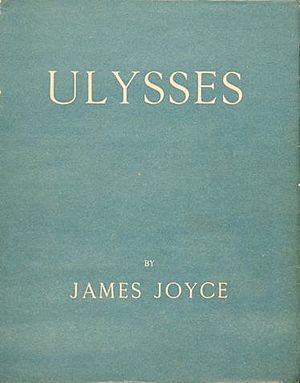Stream of consciousness writing facts for kids
Stream of consciousness is a writing style that tries to show the thoughts and feelings of a character as they happen. It's like peeking inside someone's mind and seeing everything they think, feel, and notice, all mixed together. This style often jumps between ideas, memories, and observations, just like our own thoughts do.
Sometimes, this writing style focuses only on a character's inner thoughts, without much description of the outside world. This is called an interior monologue. The idea of using "stream of consciousness" to describe literature came from psychology and was first used by May Sinclair. This way of writing became very popular during the Modernist movement in the early 20th century.
Contents
What is Stream of Consciousness?
Imagine your mind is like a river. Thoughts, feelings, and memories flow through it constantly. Stream of consciousness writing tries to put that exact flow onto paper. It doesn't always follow a clear, logical order. Instead, it might jump from one idea to another, just like your mind does when you're daydreaming or thinking deeply.
How Writers Use It
Writers use different ways to show this flow of thought:
- No clear paragraphs: Sometimes, sentences run into each other without traditional breaks.
- Unfinished thoughts: Characters might have thoughts that aren't fully formed or complete sentences.
- Sensory details: The writing often includes what the character sees, hears, smells, tastes, and touches, as they experience it.
- Inner voice: It feels like you're listening directly to the character's thoughts, even if they don't say them out loud.
Famous Examples in Literature
Many well-known authors have used stream of consciousness to make their characters feel more real and their stories more immersive. Here are a few important examples:
- James Joyce's Ulysses is one of the most famous examples. It follows a character named Leopold Bloom through a single day in Dublin, showing his every thought. A very famous part is Molly Bloom's Soliloquy, which is a long, flowing thought from one of the characters.
- Virginia Woolf often used this style. In her book Mrs. Dalloway, she explores the inner lives of several characters over one day in London. To the Lighthouse and The Waves also use this technique to show deep thoughts and feelings.
- William Faulkner used stream of consciousness in books like The Sound and the Fury and As I Lay Dying. His writing can be challenging because it jumps between different characters' thoughts and times.
- The Tale of Genji, written by Shikibu in Japan many centuries ago, is sometimes seen as an early example of this style, showing the inner thoughts of its characters.
- Marcel Proust's In Search of Lost Time is another long and famous work that explores memory and inner experience in great detail.
These authors used stream of consciousness to give readers a very close and personal look into the minds of their characters, making the stories rich and complex.
Why is it Important?
Stream of consciousness was a big change in how stories were told. Before this, most stories focused on what characters did and said. This new style allowed writers to explore the deeper, often messy, inner world of people. It helped readers understand characters' motivations and feelings in a much more detailed way. It also showed that human thoughts are not always neat and orderly, but can be a mix of many things at once.
See also
 In Spanish: Corriente de conciencia para niños
In Spanish: Corriente de conciencia para niños


